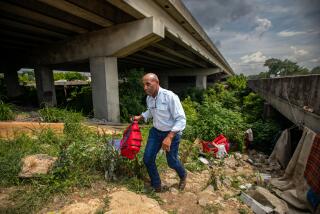Survival, Hour by Hour
- Share via
GULFPORT, Miss. — The Sparkmans woke up hungry.
They were home, and that was a blessing, considering that so many thousands along the Mississippi and Louisiana coasts have nothing. But home is now a forbidding place.
The daily hunt for water, ice and food is all-consuming. The sense of isolation is overwhelming.
Without power and phones, without batteries for the radio, many families have no means of finding out where they can get a free supper -- or even where, amid Katrina’s devastation, their congregation will gather for prayer.
The Sparkmans, alone in the wreckage of their lives, exhausted and a little afraid, did not know where to start.
Twelve members of the extended family are living in the least damaged of their homes: Glenda and Willie Sparkman’s rental at 1204 Joseph St. A massive oak tree pokes through the roof. The living room walls, smudged with mold, are starting to buckle. The whole neighborhood smells vaguely of sewage.
The baby sleeps on a towel laid over the damp carpet, his tiny back beaded with sweat. Bug bites dot his thin legs. He wails from heat and hunger. His cousins Branden, 2, and Cameron, 4, peel off their tank tops in a hopeless effort to stay cool. Cameron asks when he can go home.
The adults have no answer. It is impossible to think that far ahead. The problem of the moment is breakfast.
The pantry contains only cooking oil and some spices. They are down to five gallons of bottled water. The only supplies they have left for 3-month-old Kenyon are four small cans of formula, seven diapers and a box of wipes.
The Sparkmans are refugees in their own home, isolated and invisible among the 6-foot-high piles of debris that clog Joseph Street.
“Right now,” said Glenda, 53, “all we can do is sleep and sweat.”
*
Most members of the Sparkman family evacuated their homes before Katrina hit Aug. 29, driving across the state to stay with friends in McComb, Miss. They took all the cash they had on hand and all the food they could carry.
The canned goods went quickly, so the Sparkmans ventured to a Wal-Mart for supplies to take home. The store had enough power to keep a dim light and the manager was allowing small groups of shoppers in for 15 minutes at a time.
In line for 2 1/2 hours, the Sparkmans drew up a shopping list. But as soon as they walked in, the security guards began barking at them to leave.
“We were so flustered we didn’t get everything we needed,” Glenda said. They had time to grab diapers, bottled water, a bag of candy and a dozen cans of formula. They forgot the batteries. They didn’t get groceries.
Even without such basic supplies, they wanted to see what was left of their homes. On Friday evening, the Sparkmans made it back to Gulfport.
The house where Glenda and Willie’s daughter Keron Williams, 24, lived with her boyfriend and baby Kenyon was badly damaged. So was the house that their son Clintard Sparkman, 26, had been renting with his wife, Brandy, 23, and their two boys, Cameron and Branden. So they all camped out with Glenda and Willie on Joseph Street.
It was a miserable night.
To escape the musty smell and the heat, they tried to sleep outdoors. After a few hours, the bugs drove them inside. Everyone stripped down to underwear and T-shirts, but still, they were bathed in sweat as they tossed and turned, their limbs covered with scratches and welts.
Brandy was up before dawn.
“I was hungry,” she said. “I knew the kids were hungry. And I just couldn’t sleep, knowing that.”
Willie, 62, had set a barbecue grill on the lawn, but it looked ridiculously optimistic out there. “Why is it so difficult to get the grocery stores open?” he asked. “What are we supposed to do?”
It was Keron who thought to switch on the car radio. Tuning in to a local broadcast, she heard that the Salvation Army was serving food in Long Beach, about a two-mile drive down the coast.
The Sparkmans had one working car, a blue Mercury Sable with six gallons of gas. They had been saving the gas for emergencies. Though services were starting to return along the gulf, the uncertainty was maddening. A bank open for several hours today might be dark all day tomorrow. The gas station that pumped steadily yesterday might attract a line two miles long today -- only to run dry by mid-morning.
Willie was not willing to risk their small supply of fuel to drive around on what might well be a fool’s errand.
But this Salvation Army site sounded solid.
Breakfast, they all decided, would be worth one-sixth of a gallon.
*
They found the Salvation Army Center behind the remnants of a barbershop and what used to be the J.H. Hensley Tae Kwon Do Studio. When the family arrived about 10 a.m., there were more than 200 people in line. A few babies squalled. Most everyone else just looked tired -- not angry, not tense, just drained.
The sun was merciless. Every so often, a Salvation Army worker would pull open the door to a refrigerated truck and a billow of condensation would puff out. Those close by would lean in, trying to inhale the cold.
Cameron and Branden commandeered the boxes their mom, Brandy, had brought to carry food, turning them into fans and giant hats. When the kitchen crew poured canned peas into warming trays and spread sausage and ham onto industrial-size platters, few in line could tear their eyes away.
As the Sparkmans shuffled forward, volunteers came by to hand out big bottles of cold water. Brandy stuffed several into her purse and held another to her wrists and her neck. Cameron tried to stretch his small hands around two bottles at once.
Around them, people traded rumors. A man from Gulfport asked whether anyone had heard that the government was going to hand out generators. “It seems like a thing they should do,” he said. “But it seems silly, if it’s true, because there’s no gas to run ‘em.”
In fact, all along the coast, people need supplies far more basic than generators.
“We’ve got water, we’ve got ice, but we run out of [meals] on a daily basis,” said James D. Johnston, a public information officer for Hancock County, on the Louisiana border.
“The story is always the same: It’s in the pipeline,” Johnston said. “Hell, it’s seven days down the road since the hurricane. The human suffering going on here is unbelievable.”
From its base camp by the tae kwon do studio, the Salvation Army distributed 15,000 meals in two shifts one recent day -- and plans to increase that soon, said Leisa Hall, who oversees the food center.
“The last time there was a big hurricane in this area,” Hall said, “we were here for two years.”
Two years seems impossibly distant. Life here crawls hour to hour, meal to meal.
Before the hurricane, Glenda was a casino telephone operator. Her son Clintard worked casino security. Neither of them knows when they will have a job again; Katrina severely damaged all the casinos on the gulf.
They still have a few paychecks coming to them. Also Willie’s disability check: Injured in a construction job a decade ago, he draws Social Security on the first of every month.
But there is no mail delivery along Joseph Street. Katrina blew away the post office. There are rumors that another post office might have the checks, but Glenda doesn’t want to risk the gas. Even if she got her check, she’s not sure she could find a bank to cash it.
“Do you know what this does to a person’s pride?” Glenda asked. “You don’t want someone to feed you. [But] where can we go? We need the handout. And that feels very shameful.”
After 90 minutes in line, the Sparkmans got breakfast: a Styrofoam container with a slice of ham, a few pieces of white bread, a scoop of peas and several spoonfuls of yellow pudding. The volunteers also gave them six bags of ice.
Smiling at Cameron and Branden, a server handed each a jumbo box of Pop-Tarts. The boys took one look at the pictures on the cover, mumbled that they didn’t like cherry and tossed the boxes back.
“Pick up that box!” Brandy pleaded. She sounded embarrassed as she told her sons: “We need that box!”
A volunteer rummaged through the supplies and pulled out a dozen chocolate Pop-Tarts. Brandy gratefully packed them away.
“Well, that’s breakfast for tomorrow, at least,” Keron said.
Back at home, Cameron scooped some of the ice in a paper cup. As he ran across the living room, he tripped. “Go on, Cameron, pick it up,” Brandy told him.
The 4-year-old dropped to his knees and picked every shard of ice from the moldering shag carpet.
Then he licked his fingers and tipped his cup to drink.
*
After two nights on Joseph Street, the Sparkman family decided they had to gamble. They needed gas -- to forage more effectively, to feel less trapped.
So early Sunday, the women drove to a station rumored to be open. It was, and they waited in line all day -- only to be turned away just as they reached the pump.
While they were gone, a neighbor came by to announce that she was headed to buy gas in Mobile, Ala., about a 70-mile drive. Willie gave her a 10-gallon container and $65. She returned in the evening with the gas can full -- but no change.
“It took all the money to get you this,” Willie said she told him.
The Sparkmans were down to $88. They were still getting meals from the Salvation Army, twice a day. But how they would get formula, or diapers, or more fuel when their cash ran out, no one knew.
“I can’t think about that right now,” Willie said. “We try not to get frightened.”
He did have good news: Memorial Hospital, several blocks away, had opened its taps to the public. The water looked a little gray, but it was better than the foul-smelling creek water they had collected earlier. So he and Clintard trudged over there several times a day to fill their buckets.
On Monday morning, in celebration of the new water supply, the adults washed for the first time in eight days. Then, Willie said, “we just broke down.” They dipped into the melting ice in their cooler to brush their teeth.
He felt a little better after that. The car’s gas tank was half full, so the family could afford to chase rumors of an open grocery store. They knew where to get free meals. And their carpet was drying out.
There were even signs that authorities were moving in to help. On Monday morning, a man knocked on the Sparkmans’ door and said he had been sent -- he didn’t say by whom -- to remove the tree that had crashed onto their roof. Before he left, he even tacked tarpaper over the holes.
All in all, Willie said, the family was getting by on Joseph Street. They had survived today.
Come morning, they would worry about tomorrow.
*
Times staff writers John-Thor Dahlburg in Bay St. Louis, Miss., and Stephanie Simon contributed to this report.
More to Read
Sign up for Essential California
The most important California stories and recommendations in your inbox every morning.
You may occasionally receive promotional content from the Los Angeles Times.













